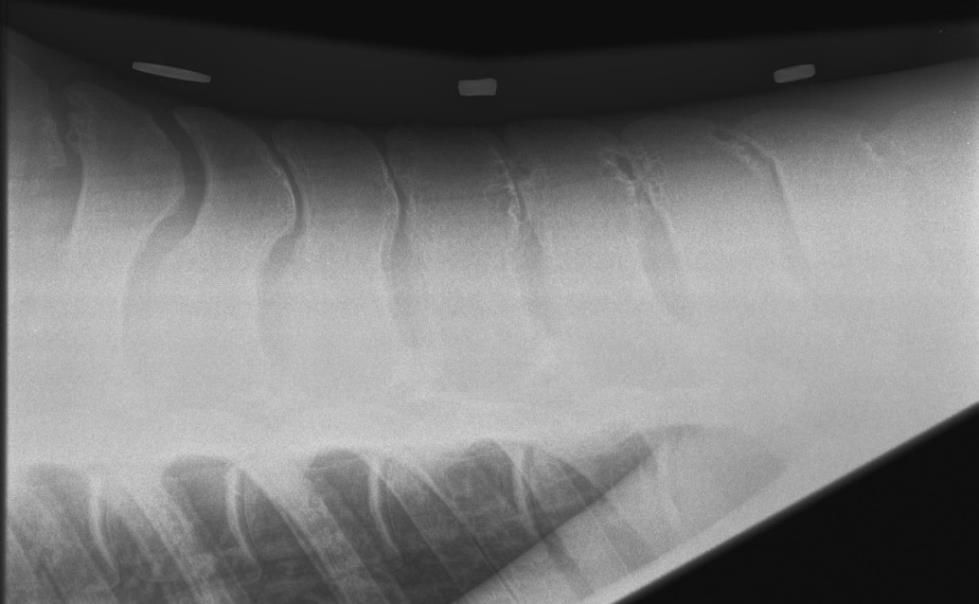ODSP (Kissing Spine) Surgery Information
Over riding or impinging dorsal spinous processes, (colloquially known as “Kissing Spines”), can be a cause of back pain in the horse. In this condition the normal spaces between the spinous processes of the horse’s vertebral column are reduced and in some horses pain can arise from the bone-to-bone contact and disruption to the ligament between the processes. Historically the surgical procedure was performed under general anaesthesia through a large incision. At B&W the majority of these surgeries are now performed standing through several small incisions.
 The horse is sedated and after injecting local anesthetic small incisions are made through the skin over the affected processes under X-ray guidance. The front of each affected process is then removed. Following this the incisions are closed with absorbable sutures under the skin and skin staples. The surgical site is then covered with a sticky dressing. At B&W Equine Hospital the surgery is performed by one of two specialist surgeons assisted by a team of nurses.
The horse is sedated and after injecting local anesthetic small incisions are made through the skin over the affected processes under X-ray guidance. The front of each affected process is then removed. Following this the incisions are closed with absorbable sutures under the skin and skin staples. The surgical site is then covered with a sticky dressing. At B&W Equine Hospital the surgery is performed by one of two specialist surgeons assisted by a team of nurses.
What to expect
- We will ask that you bring your horse to the hospital the day before its surgery in order for it to settle in and be prepared appropriately.
- If your horse is insured we advise that you contact your insurance company before surgery to notify them of the plan; some insurance companies require a report from us prior to surgery.
- A full clinical examination of your horse is performed, including careful examination of their heart and lungs.
- If no significant abnormalities are detected a small patch will be clipped on your horse’s neck and an intravenous jugular catheter will be placed to enable quick intravenous access during the surgery and administration of medications.
- The horse is groomed and the surgical site is clipped and has a preliminary scrub.
- On the day of surgery, preparation of your horse will begin roughly an hour before surgery. The surgical site will be scrubbed further and the pre-operative medication including a sedative, antibiotic and painkiller are given half an hour before surgery.
- You will receive a phone call as soon as your horse’s surgery is complete. This is normally from a member of the reception team as the surgeon is often beginning their next case.
- We advise that owners do not visit on the day of surgery.
- Your horse will be carefully monitored post-operatively to ensure it remains comfortable. Colic is one of the complications occasionally seen in the post-operative period. Once your horse begins passing droppings we will start to re-introduce hay to their diet.
- You will receive a phone call from the surgeon later on in the day giving you a full update on the surgery itself. This call can sometimes be quite late in the evening if it has been a busy day of operating, or if emergencies arise.
- Horses undergoing the surgery often remain in the hospital for 48 hours post-operatively, in order for them to be monitored closely and receive a course of intravenous antibiotics and painkillers.
- On discharge you will be given detailed written instructions that will include the plan for your horse’s recommended staple removal, management, exercise and re-examination.
 The horse is sedated and after injecting local anesthetic small incisions are made through the skin over the affected processes under X-ray guidance. The front of each affected process is then removed. Following this the incisions are closed with absorbable sutures under the skin and skin staples. The surgical site is then covered with a sticky dressing. At B&W Equine Hospital the surgery is performed by one of two specialist surgeons assisted by a team of nurses.
The horse is sedated and after injecting local anesthetic small incisions are made through the skin over the affected processes under X-ray guidance. The front of each affected process is then removed. Following this the incisions are closed with absorbable sutures under the skin and skin staples. The surgical site is then covered with a sticky dressing. At B&W Equine Hospital the surgery is performed by one of two specialist surgeons assisted by a team of nurses.